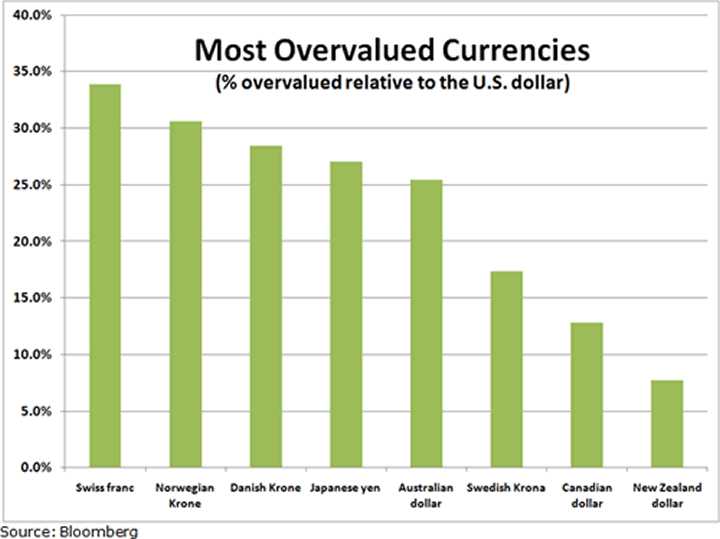Can Switzerland and Japan Solve Their Currency Problem?
Currencies / Forex Trading Sep 11, 2010 - 01:44 PM GMTBy: Bryan_Rich
 Currencies play an important role in the economic health of a country — impacting the flow of trade and capital.
Currencies play an important role in the economic health of a country — impacting the flow of trade and capital.
For instance, a weak currency can be quite good for an economy in times of recession. It stimulates demand for a country’s exports, which can drive growth in manufacturing, boost employment and give overall economic performance a nice jolt. And for foreign investors, a cheap currency makes a country’s investments more attractive.
On the other hand, a strong currency can be a benefit too. It can give consumers access to cheaper production and higher growth assets in foreign markets, which can improve their standard of living.
Moreover, a country’s currency plays a huge role in the perception of its global economic stability and safety. Indeed important.
But there becomes a problem when a currency is too weak or too strong …
A currency that’s too weak, or one that could weaken materially in the future, can drag down an economy. It can scare foreign investors away and can cause existing foreign investments to flee.
Conversely, a currency that’s too strong can depress a country’s exports and ultimately cause deflation.
And That’s Precisely What We’re Seeing in Switzerland and Japan
Because Switzerland and Japan maintained relatively low interest rates when the global economy was booming — before the financial crisis started — the Swiss franc and the yen were popular funding currencies for the massive carry trade.
|
The unwinding of this trade, along with the fall in competitive global interest rates over recent years, has kept these currencies persistently strong, even in the face of deep recessions.
Historically, countries dealing with recession tend to rely heavily on exports as a tool to return to sustainable growth — a needed bridge in order to rebuild domestic demand.
But with currencies that have strengthened more than 30 percent relative to their major trading competitors, Switzerland and Japan have been at a distinct disadvantage.
Consider this …
Since the middle of 2007, when the subprime problem began to rear its head, the Swiss franc has appreciated 23 percent against the euro and nearly 40 percent against the British pound. That’s made exporting to these two important markets considerably less competitive.
This is why Switzerland has intervened numerous times in an attempt to stem the tide of currency appreciation against the falling euro and pound. But it hasn’t worked. The sovereign debt risk in the euro zone and UK has been too overwhelmingly negative on their currencies.
|
As for Japan: Japan is a heavily export-dependent economy. And its main trade competitor in Asia is China. Given that China has kept its currency very closely aligned with the value of the U.S. dollar through the economic crisis, the yen has soared in value relative to the yuan — to the tune of 24 percent.
This exchange rate disadvantage is a key reason why Japanese officials have been “on watch” for intervention to weaken the yen.
But What Is a Fair Value for the Franc and the Yen?
For our guide, let’s take a look at the market’s estimate of the current “fair value” of currencies.
We’ll use an economic theory known as purchasing price parity (PPP), which adjusts the exchange rate so that an identical product in two different countries has the same price when expressed in the same currency.
In the chart below, you can see some of the most overvalued currencies according to the Organization for Economic Co-Operation and Development’s (OECD). The axis on the left shows how overvalued these currencies are based on PPP.
|
According to this measure, the Swiss franc is the most overvalued currency in the world, relative to the U.S. dollar. Also sitting well in overvalued territory is the Japanese yen.
Given the likelihood of another round of crisis in the euro zone, the Swiss aren’t likely to see the tide of the Swiss franc change against the euro. But, if risks continue to elevate, the Swiss franc should weaken against the dollar, as it did during the first half of 2010 — giving the Swiss some relief.
As for the yen, it appears that nothing short of actual intervention will change the tide of the yen, to release the pressure valve on its exporters. And I expect that will happen, which represents an opportunity for currency investors.
Regards,
Bryan
P.S. I’ve been showing my World Currency Alert subscribers how to use exchange traded funds to profit from rising and falling currencies, like the Swiss franc and the Japanese yen. Click here to discover more.
This investment news is brought to you by Money and Markets. Money and Markets is a free daily investment newsletter from Martin D. Weiss and Weiss Research analysts offering the latest investing news and financial insights for the stock market, including tips and advice on investing in gold, energy and oil. Dr. Weiss is a leader in the fields of investing, interest rates, financial safety and economic forecasting. To view archives or subscribe, visit http://www.moneyandmarkets.com.
© 2005-2022 http://www.MarketOracle.co.uk - The Market Oracle is a FREE Daily Financial Markets Analysis & Forecasting online publication.






